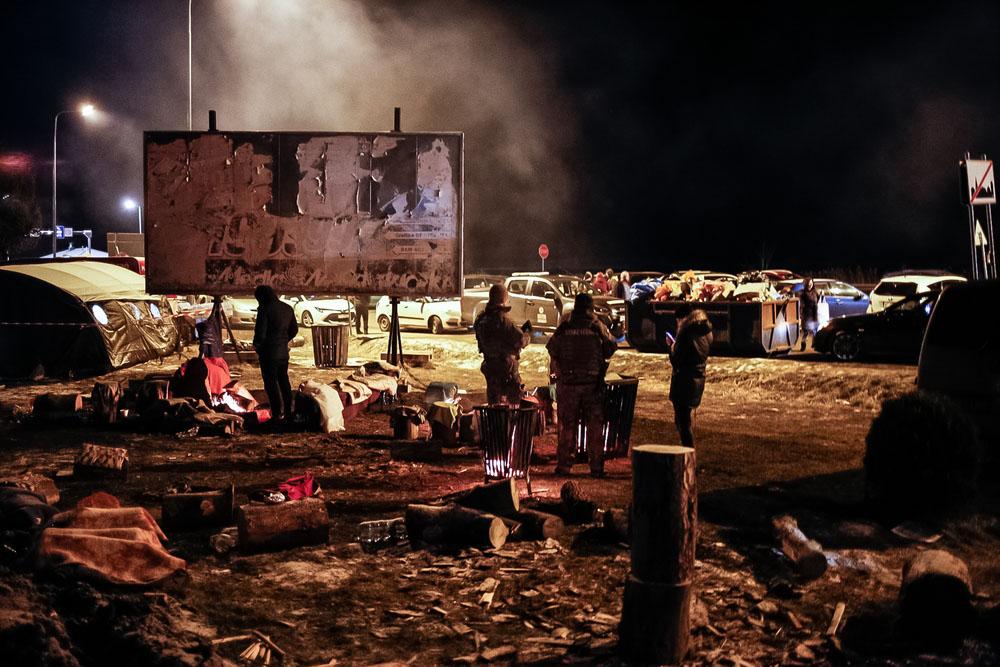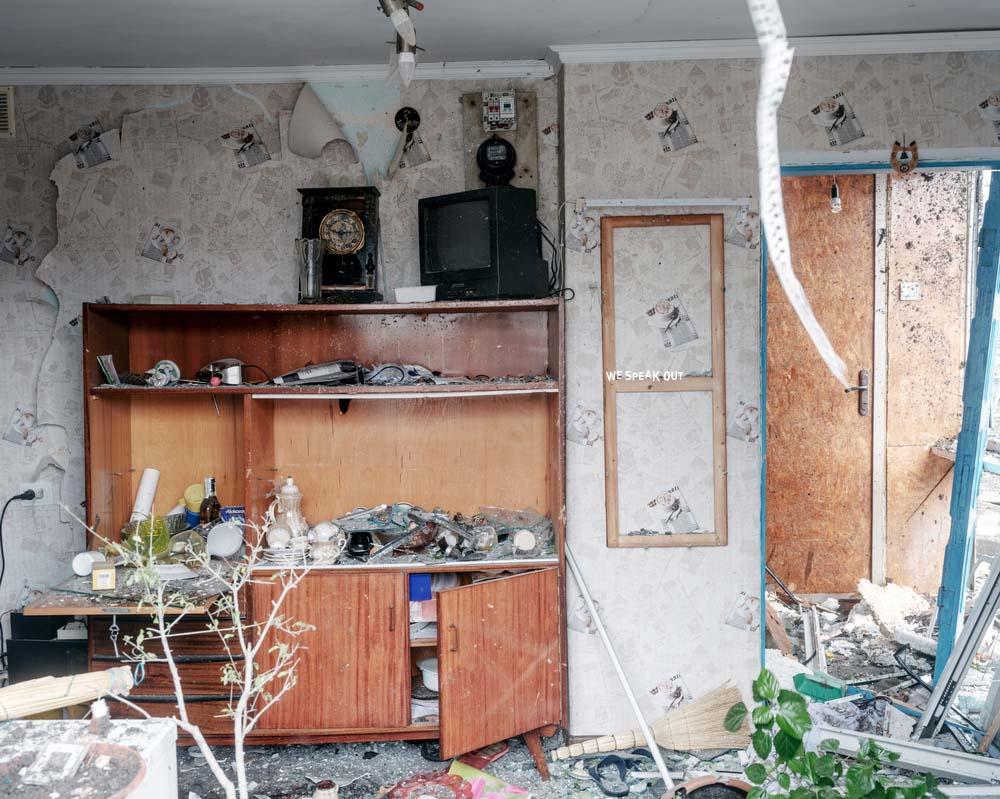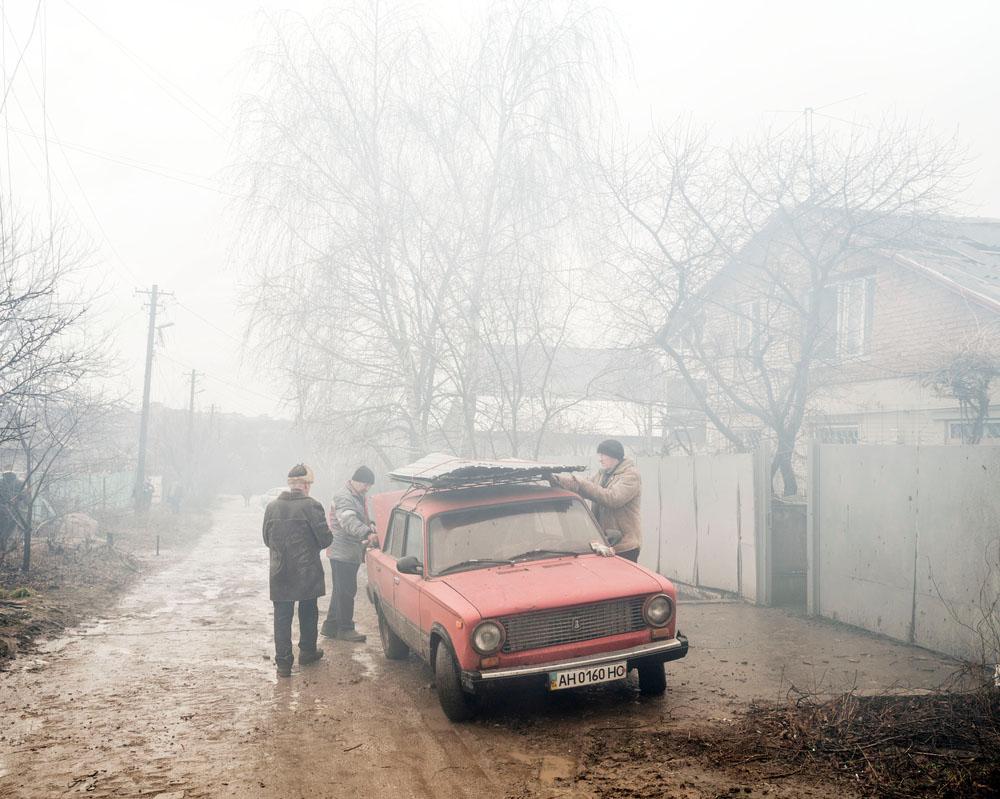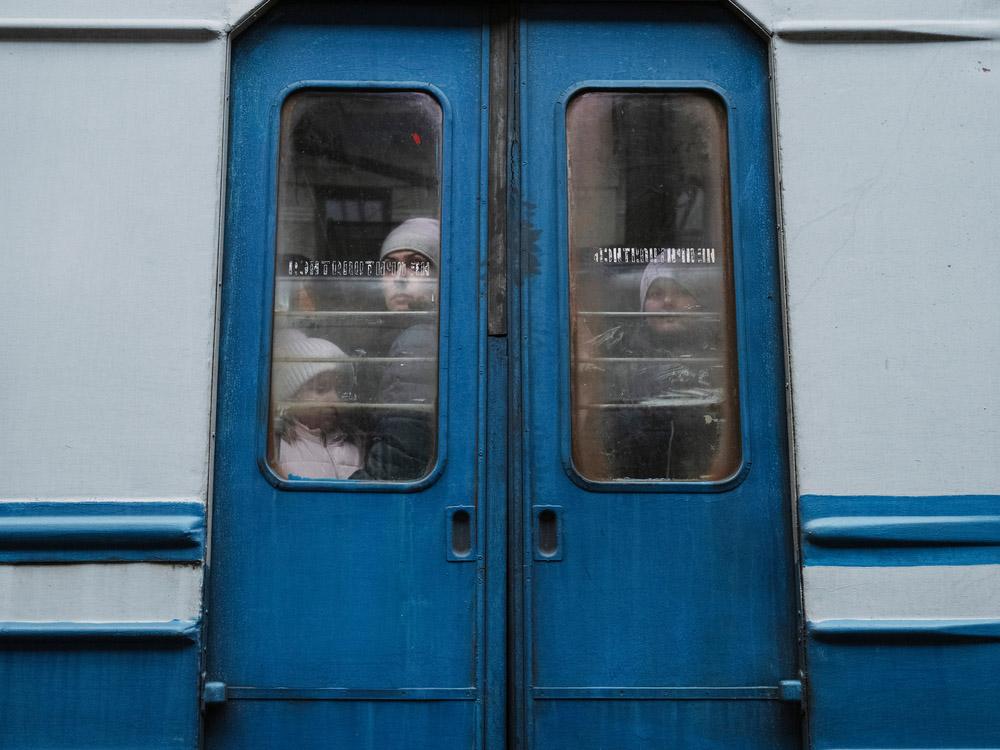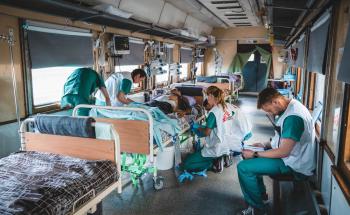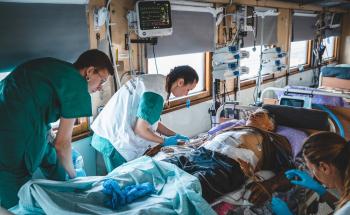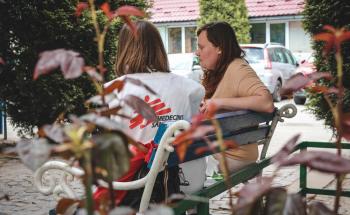Following the continuous low-level conflict in eastern Ukraine, in Donetsk and Luhansk oblasts (provinces) since 2014, in late February 2022, Russian forces attacked multiple cities across all of Ukraine, leading to full-scale war.
The intense fighting and shelling have led to over one million people leaving Ukraine and becoming refugees. MSF teams had been working in eastern Ukraine and have now suspended our usual medical activities, including our HIV and tuberculosis programmes.
As war escalates in Ukraine and people flee, our teams are stepping up our response to a deepening humanitarian crisis, both in Ukraine and in neighbouring countries.
Ukraine
CURRENT SITUATION
We are starting to see the impact of a sharp escalation in conflict on civilians.
There is full-scale warfare in many areas, making movements difficult, dangerous or simply impossible; determining the true extent of medical needs in Ukraine is challenging.
We have been in contact with hospitals that are receiving patients wounded as a result of the fighting. The conflict is putting a huge amount of pressure on health facilities that have limited staff and supplies; many hospitals are facing shortages. It is difficult to find medical and other crucial supplies in the country, as these are in high demand to meet the needs of so many patients.
Over a million people have been forced to leave Ukraine, while many others are displaced within the country.
All regular activities were halted on 24 February, and some staff relocated towards the west of the country, while emergency response preparedness plans were activated. MSF coordination set-ups moved out of the capital Kyiv on 25 February. Since then, our teams have been working night and day to shift to a war-zone medical humanitarian response in Ukraine.
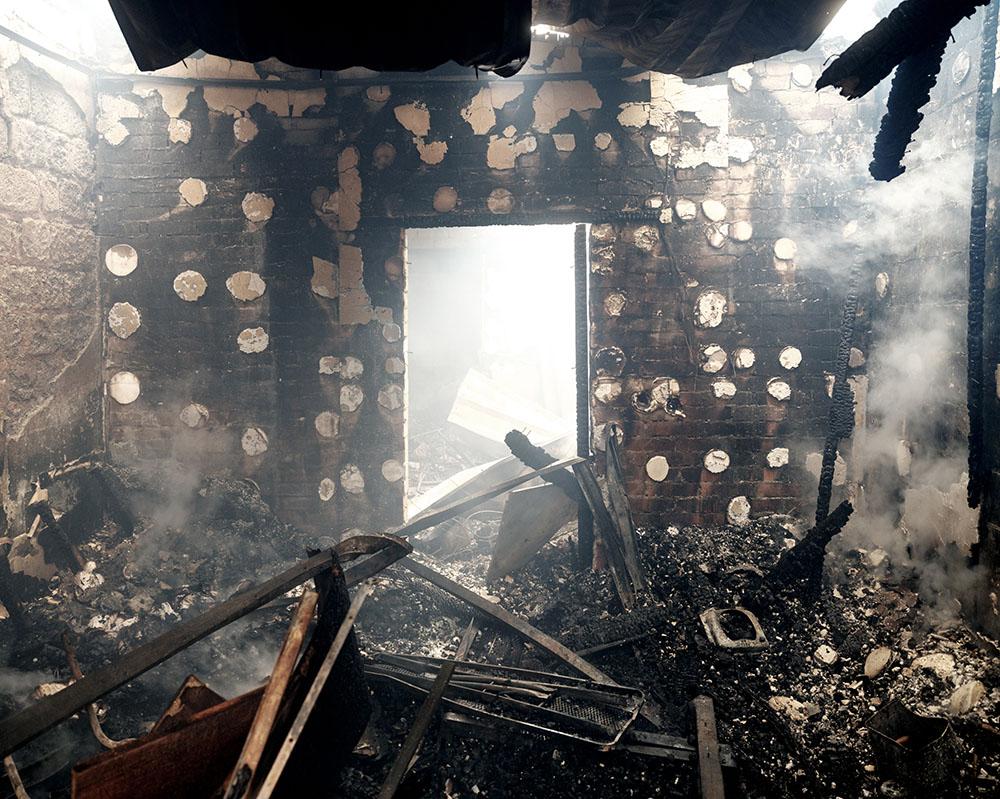
MSF RESPONSE
Our teams are preparing for a range of scenarios that will allow us to step up our response, including providing surgical care, emergency medicine and mental health support for displaced people. Our current response includes:
- Rushing new cargo shipments of emergency medical supplies to Ukraine;
- Donating the few remaining relevant medical stocks we have, mostly for emergency surgery and trauma care, to health facilities located in areas currently under active fighting;
- Sending experienced emergency and specialist medical staff to Ukraine to support our existing teams;
- Supporting hospitals and doctors remotely, including through providing training on trauma care, and via telemedicine means;
- Preparing warehouses and transport facilities for our supplies;
- Assessing needs in the country and the possibility to reach cities such as Odesa, Mykolaiv or Kherson.
MSF is working to rapidly scale up our medical and humanitarian response in various parts of the country, based on where we see the greatest need and the best opportunity for our assistance to have a significant impact.
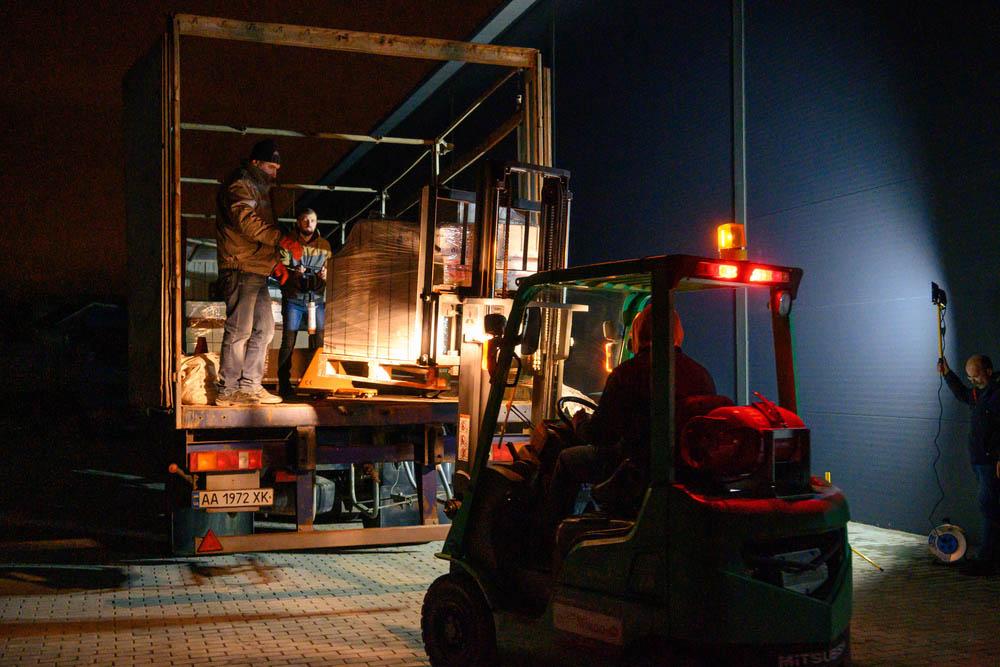
HELPING HOSPITALS TO PREPARE
In many parts of the country, we are working with medical facilities to help them be ready for what might come next. In the southern city of Odesa, we were able to donate medical supplies to hospitals preparing to accept wounded in the event of an attack. In Lviv, in western Ukraine, our teams are providing mass casualty training and helping hospitals prepare for mass influx of wounded.
In Vinnytsia, we are working with local hospitals to help them prepare for mass casualty events and exploring how we can provide water and sanitation support. In Bila Tsverka, 80 km south of Kyiv, a hospital that specializes in surgery has been identified. An MSF team will provide a 2-day training on managing a mass influx of casualties and establish what is needed in terms of supplies.
In the east of the country, MSF surgeons with experience working in war zones have, since just before the current outbreak of war, provided remote training to surgeons in key hospitals that have since been receiving many wounded. We have also provided supplies to numerous hospitals in eastern Ukraine, Kyiv, and other parts of the country.
MULTIPLE, OVERLAPPING MEDICAL NEEDS – MORE SUPPLIES NEEDED ALL THE TIME
So far, the focus has been on surgical, trauma, ER (Emergency Room) and ICU (Intensive Care Unit) equipment and drugs. But a broader picture of other key medical items is starting to emerge insulin for diabetes patients, medicines for patients with other chronic diseases such as asthma, hypertension or HIV. Some of these will need to be transported with the added complexity of a cold chain. Getting supplies to where they are needed in Ukraine will be a challenge. The trains are still mostly running, and this is a good option because of the volume they can take, but we are looking at multiple ways of moving medical supplies around the country safely. We fear that it will get harder, perhaps rapidly so, to move medical supplies and medical staff to where they are needed, hence the real urgency to move fast on this now.

ASSISTING DISPLACED PEOPLE
Many displaced people are now sheltering in Lviv and other towns in western Ukraine. Often, they have left their homes with only what they can carry. Local volunteers and civil society organisations are working hard to help them, but conditions are harsh, with available accommodation already full to overflowing and temperatures as low as -10 at night. MSF will be donating a large supply of cold-weather items (sleeping bags, warm clothes, tents) to civil society organisations supporting displaced people and refugees. We are also assessing how we can provide medical support for these people.
MOBILE CLINICS
One of the areas where we are seeing high numbers of displaced people is Vinnytsia (in west-central Ukraine). This town is a crossroads for many routes crisscrossing Ukraine (including from east to west). MSF is looking into starting mobile clinics in the region to provide basic medical care to displaced people.
A team has started mobile clinics along the border with Hungary, where there are significant numbers of people gathered.
Poland
CURRENT SITUATION
According to UNHCR, more than 1.83 million people have fled Ukraine to Poland. Our teams are trying to get essential staff and medical supplies into Ukraine via Poland.
In Poland, the number of daily arrivals continues to increase daily. Our emergency teams are at the Polish-Ukrainian border and elsewhere in Poland assessing medical humanitarian needs. We are also trying to get essential staff and supplies into Ukraine and set up emergency response activities across both sides of the border.
So far, our operations inside Poland remain modest. This is mostly because there is already a robust response by Polish civil society. MSF has donated shelter-related items to the Red Cross Lublin. Our teams have visited transit centres in five cities (Warsaw, Lodz, Wroclaw, Katowice, Krakow) mostly based at train stations, and a few temporary shelters. Our teams saw hundreds of people, including children, sleeping on the floor of Krakow train station. Our teams have also spoken to people arriving at transit centres in Wroclaw, Krakow and Katowice. They met people who had travelled from different areas of Ukraine, mostly from Kharkiv, by train. MSF observed many people were distressed, confused or disoriented, and many had no plans on where to go next.
We have met and spoken to local authorities, NGOs, civil society groups and volunteers helping men, women and children crossing and providing tea, soup, clothes and blankets.
MSF teams are also based in Poland to support our activities in Ukraine with supplies of medicines and medical equipment.
MSF RESPONSE
So far, our operations in Poland remain modest, but we are scaling up.
- Our emergency teams are at the Polish-Ukrainian border and elsewhere in Poland assessing medical humanitarian needs.
- We are trying to set up emergency response activities across both sides of the border.
- MSF donated shelter-related items to the Red Cross in Lublin, Poland, located about 100 kilometres from the Ukraine-Poland border.
Since the outbreak of fighting across the country, MSF teams have been working around the clock to mount a response to meet urgent needs.
MSF donated NFI items to Red Cross Lublin and to a reception point in Horodlo, near Zosin border crossing. Our teams have visited border crossings, transit centres, and train stations. We intend to start providing Psychological First Aid (PFA), self-care and counselling trainings to volunteers.
SUPPLIES TO HOSPITALS
MSF has been in contact with hospitals across the country. Many of them are desperately in need of supplies to treat war-wounded and provide ongoing care for patients with chronic diseases and other conditions. MSF has now donated most medical supplies we had prepositioned in the country, including donating surgical/trauma and mass casualty kits to hospitals in the east of the country and in Kyiv. Additional MSF supplies have begun to reach the country.
This past weekend (Saturday 05 March), MSF was able to bring in 120 m3 of medical supplies – a third of these supplies were immediately rushed on by train to the Ministry of Health in Kyiv for use in hospitals in the capital and in towns further east. Additional supplies will be arriving in the country this week and beyond. An important focus for the MSF teams will be to ensure that we are able to provide the right medical supplies to the right hospitals at the right time, based on their needs and the challenges they are facing.
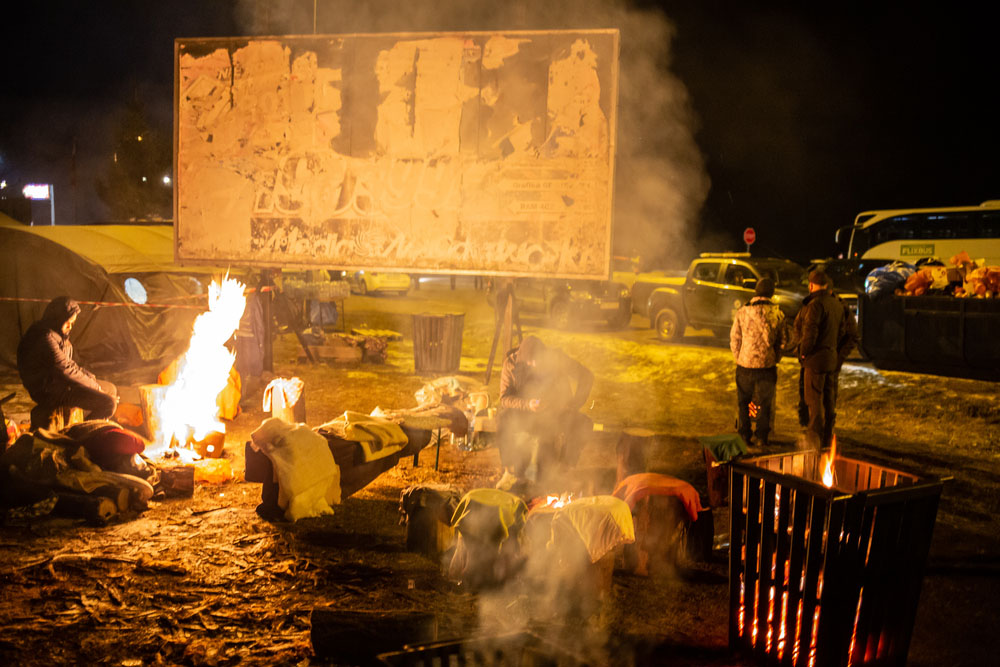
Eastern Ukraine
MSF has been working in eastern Ukraine since 2014. Since the war started, we have maintained contact with the volunteers and health facilities we work with. They continue to provide information to help MSF identify needs, particularly in terms of supplies needed by hospitals.
Since 24 February, we have donated medical supplies to help hospitals treat people injured as a result of the conflict. Some hospitals have reported that they have treated dozens of wounded people at times. Hospitals also report shortages of medications to treat people with chronic diseases such as insulin for patients with diabetes.
Kyiv
An MSF surgical team conducted mass casualty training and hands-on war-surgery training in a paediatric hospital and provided brief mass casualty training for two other hospitals. Teams will also provide additional training and support to build on this. In Bila Tserkva, 80 km south of Kyiv, a hospital that specializes in surgery has been identified. An MSF team will provide a 2-day training on managing a mass influx of casualties and donations have been made to health facilities in the Oblast.
Western Ukraine
Teams are assessing the needs in various towns/cities in western Ukraine. In Lviv, teams have begun offering training to hospitals to support them to manage large numbers of wounded arriving at the same time and dealing with war wounds.
Southern Ukraine
The health system has already been disrupted by the war. Most importantly, supplies are running low at many hospitals. This will affect the ability of hospitals to respond to the direct consequences of war, as well as to treat patients with chronic diseases. Cities such as Odesa are preparing for further attacks and siege.
In the southern city of Odesa, we were able to donate medical supplies to hospitals preparing to accept the wounded in the event of an attack. A Mass Casualty Plan (MCP) training should start this week in Odessa in a medical facility.
Extremely dire situation in Mariupol
Mariupol city is currently surrounded and subject to heavy shelling. Our staff tell us that shops are no longer functioning, and most have been cleaned out by people looking for basics such as food. There is no heating or electricity. Pharmacies have run out of medicine. Most worryingly, there is no access to clean water – staff report that people are melting snow and collecting rainwater to drink and breaking open heating systems to wash their hands. Over three days (5, 6 and 7 March) a ceasefire was three times agreed to allow civilians to move out of the city safely. Each time the ceasefire failed. The situation in the city is growing more and more desperate.
16 March 2022
The city remains surrounded by military forces and subject to repeated artillery and aerial bombardment. Residents shelter in basements. Shops no longer function. Food and clean water are difficult to find. Pharmacies have run out of medicines. People are lying dead in the streets. Gas and electricity have been off for days, in sub-zero temperatures.
People are making fires to cook food and keep warm. Many attempts at establishing a ceasefire to allow safe passage for those who wish to leave have failed, though one convoy of about was allowed to leave the city on Monday. Civilian and medical infrastructure has been damaged. Communication is extremely limited.
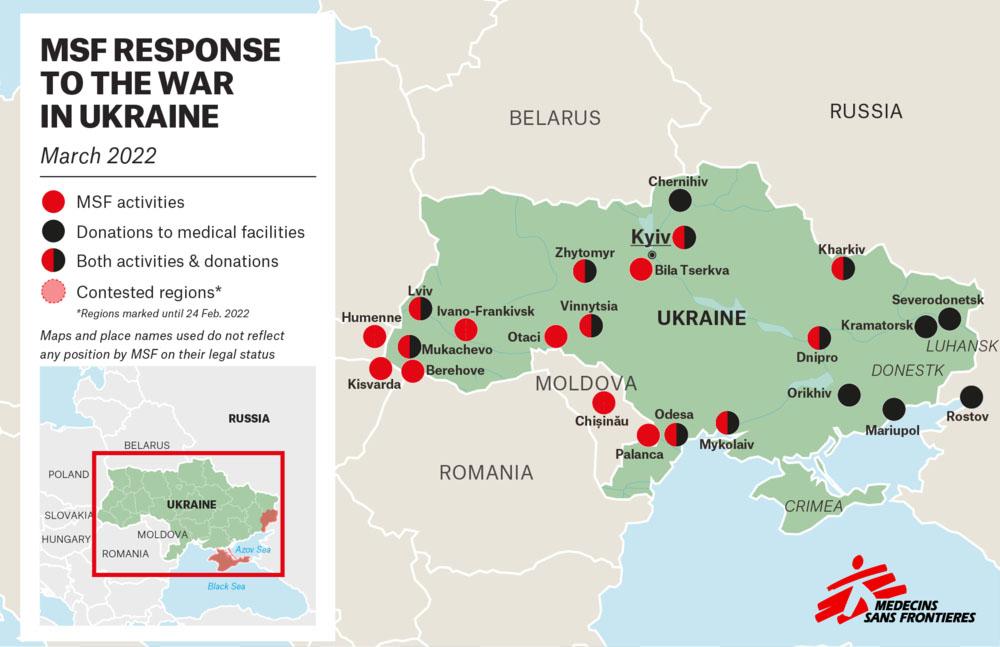
Zhytomyr (northwestern Ukraine)
In and around Zhytomyr, we have donated trauma-related supplies and conducted similar mass casualty training in six hospitals. Follow up work is envisaged to build on this initial support. We have also been able to move a considerable part of our TB (tuberculosis) supplies from Kyiv to Zhytomyr, where we were previously running a TB program.
Dnipro and eastern Ukraine
In the east of the country, MSF surgeons with experience working in war zones provided remote training to surgeons in key hospitals that have been receiving many wounded since the full-scale war began. We have also provided supplies to numerous hospitals in eastern Ukraine, Kyiv, and other parts of the country. In Dnipro, we have donated medical supplies to the regional hospital and are helping them to prepare for future needs. In Kramatorsk, we have donated supplies to seven hospitals with the highest needs.
Lviv (western Ukraine)
In Lviv, our teams have provided mass casualty training and assisted hospitals to prepare for mass influx of wounded.
Vinnytsia (west-central Ukraine)
In Vinnytsia, we are working with local hospitals to help them prepare for mass casualty events and exploring how we can provide water and sanitation support. Our teams have also made donations to health facilities in the Oblast.
Mukachevo (southwestern Ukraine)
We have also helped the main referral hospital in Mukachevo, in the southwest near the Hungarian border, with mass casualty training in case they receive large influxes or referrals of wounded patients.
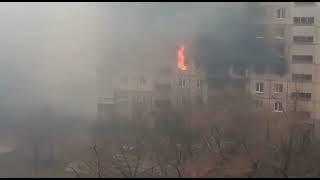
Mariupol, eastern Ukraine
Poland
According to UNHCR, over 2.1 million people have fled Ukraine to Poland. Our teams are trying to get essential staff and medical supplies into Ukraine via Poland.
In the first few days of the response, MSF donated some essential relief items to Red Cross Lublin and to a reception point in Horodlo, near Zosin border crossing.
Hungary
SITUATION AND RESPONSE
In Hungary, we have an initial team assessing the situation and needs of people crossing the border, with a focus on identifying less visible needs for particularly vulnerable people or groups.
While initial assessments indicated that many of the immediate needs of refugees are being adequately met, we have started mobile clinics in partnership with local organisations and with the support of Hungarian doctors to be able to provide primary healthcare and psychological first aid. We need to see how the situation develops and whether there are vulnerable individuals or groups that are missing out on essential services and support.
Moldova
SITUATION AND RESPONSE
MSF has sent teams to the north and southeast to assess the situation of refugees at the border crossing points and focusing on analysing the possibility to support chronically ill patients or mental health needs. In Palanca, MSF will start providing primary health care consultations for refugee populations starting 9 March.
As of 22 March, over 371100 people have crossed into Moldova from Ukraine, many in transit. Moldova, which has a population of only 2.6 million people, hosts the largest concentration of Ukrainian refugees per capita (UNHCR).
MSF has sent teams to border points in the north (Otaci) and southeast (Palanca). On March 12th, in Palanca, MSF started providing primary health care consultations and Psychological First Aid (PFA) sessions for refugees, as well as basic need support for families fleeing from Mikolayiv and Odessa region. Similar activities started in Otaci this week, where MSF has opened a medical point. We have already started training local volunteers in PFA.
MSF’s mental health team has also provided psychological first aid to people in reception facilities in the capital, Chișinău. Assessments in different hospitals of the city are also ongoing to evaluate how to improve access to health care for refugees.
Slovakia
CURRENT SITUATION
Around 79,000 refugees have crossed into Slovakia as of 2 March, according to UNHCR, although most people seem to be in transit.
MSF RESPONSE
Our first emergency team arrived in Slovakia at the beginning of March, and, after an initial assessment, we are now collaborating with the Ministry of Health to support the response. We are also negotiating a Memorandum of Understanding to be able to import medical supplies and work here.
For the moment, the critical humanitarian and medical needs are covered by the local authorities and civil society, so our approach will be to fill the gaps as the situation becomes more overwhelming. We plan to have a mobile team monitoring regularly at the border, offering mental health support, facilitating emergency referrals and taking care of the most vulnerable people.
On the Ukrainian side, we are setting up a base in the border town of Uzhgorod. We will soon set foot in the city of Ivano-Frankvisk, to be in a better position to monitor and assess areas of the southwest of Ukraine in order to support health structures including by doing donations of medical and logistic materials.
More information on the situation on the Slovakian-Ukrainian border
We have signed a Memorandum of Understanding with the Ministry of Health to be able to import medical supplies and we are now framing the scope of our collaboration with the authorities, which will likely focus on the areas of mental health, SGBV and TB for arriving refugees. For the moment, the critical humanitarian and medical needs are covered by the local authorities and civil society.
On the Ukrainian side, we are setting up bases in the towns of Uzhhorod and Ivano-Frankivsk, where we are assessing the health facilities and establishing a network for support in terms of medical donations and kits with non-food items (NFIs) for internally displaced people.
Russia
SITUATION AND RESPONSE
MSF works with the health authorities in Arkhangelsk and Vladimir regions to reduce the burden of drug-resistant tuberculosis (DR-TB) and improve treatment for the disease.
MSF is currently conducting assessments in the south of Russia to see whether new medical humanitarian needs have emerged. We have also made some donations such as food, hygiene kits, essential relief items and medicines to be distributed among displaced people.
According to UNHCR over 271,200 people have crossed to Russia from Ukraine as of 22 March. MSF is currently exploring whether new medical humanitarian needs have emerged in the regions of Russia bordering Ukraine. The team has visited Rostov and Voronezh and is heading to Belgorod. In Rostov, we have made some donations such as food, hygiene kits, essential relief items and medicines to be distributed among displaced people.
Belarus
SITUATION AND RESPONSE
In Belarus, MSF continues to run its regular programmes. We support the national tuberculosis (TB) programme and hepatitis C treatment in prisons. In 2021, we also assisted people on the move stranded between Belarus and the EU. MSF has carried out an initial assessment of the situation on the Belarus - Ukraine border and continues to be ready to assist emerging medical and humanitarian needs. As of 22 March, almost 5 thousand people have crossed into Belarus from Ukraine.
